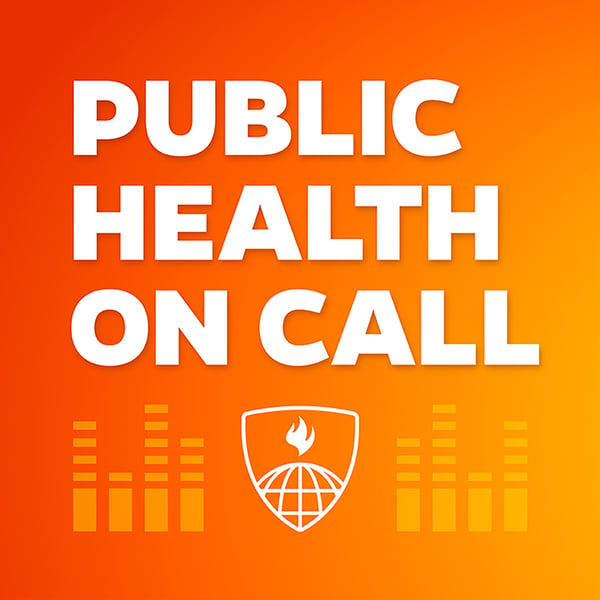914 - Reducing Food Waste to Take Climate Action
Public Health On Call
The Johns Hopkins Bloomberg School of Public Health
4.8 • 620 Ratings
🗓️ 1 July 2025
⏱️ 16 minutes
🧾️ Download transcript
Summary
About this episode:
American farms, restaurants, retailers, and households throw out nearly 30% of the food in our system, landfilling millions of tons of food each year and draining resources like land and energy. Households generate the most waste, with everyday cooks overbuying at grocery stores and throwing away a substantial portion of their purchases—but getting ahead of those scraps can make a big difference. In this episode: ReFED’s Dana Gunders covers the environmental costs of food waste and shares immediate action items to better manage it.
Guest:
Dana Gunders is a national food systems expert and the president of ReFED—an organization that researches and promotes evidence-based action to end food waste.
Host:
Stephanie Desmon, MA, is a former journalist, author, and the director of public relations and communications for the Johns Hopkins Center for Communication Programs at the Johns Hopkins Bloomberg School of Public Health.
Show links and related content:
-
From Surplus to Solutions: 2025 ReFED U.S. Food Waste Report—ReFED
-
Marylanders toss out more than 1 million tons of food each year. How do we reduce waste?—WYPR
-
From Farm to Kitchen: The Environmental Impacts of U.S. Food Waste—U.S. Environmental Protection Agency
-
We Are Eating the Earth: The Race to Fix Our Food System—Public Health on Call (June 2025)
Transcript information:
Looking for episode transcripts? Open our podcast on the Apple Podcasts app (desktop or mobile) or the Spotify mobile app to access an auto-generated transcript of any episode. Closed captioning is also available for every episode on our YouTube channel.
Contact us:
Have a question about something you heard? Looking for a transcript? Want to suggest a topic or guest? Contact us via email or visit our website.
Follow us:
-
Here's our RSS feed
Note: These podcasts are a conversation between the participants, and do not represent the position of Johns Hopkins University.
Transcript
Click on a timestamp to play from that location
| 0:00.0 | Welcome to Public Health On Call, a podcast from the Johns Hopkins Bloomberg School of Public Health, |
| 0:06.1 | where we bring evidence, experience, and perspective to make sense of today's leading health challenges. |
| 0:16.4 | If you have questions or ideas for us, please send an email to Public Health Question at jh.h.edu. |
| 0:23.9 | That's Public Health Question at jhhu.edu for future podcast episodes. |
| 0:33.7 | It's Ziz Smith Rogers. |
| 0:35.8 | Today, food waste. |
| 0:41.1 | Dana Gunders, a scientist and president of Refed, a nonprofit that works to reduce loss and waste across the food system, talks to Stephanie |
| 0:45.5 | Desmond about the vast quantities of food wasted in the U.S. and how to reduce that. |
| 0:51.0 | Gunders talks about the impacts on climate from the water and energy that goes into growing |
| 0:55.3 | and getting the food to the store to the high levels of methane gas emitted by food tossed |
| 1:00.4 | into landfills. Let's listen. Dana Gunders, welcome to public health on call. Thank you so much. I'm |
| 1:06.9 | thrilled to be here, Stephanie. So our topic today is food waste. |
| 1:12.1 | You were one of the first to sort of raise the alarm about how much food is wasted and the impacts on environment, economy, and food security. |
| 1:20.7 | So I guess the big question is, how much food are we wasting? |
| 1:24.3 | Yeah. |
| 1:24.8 | Well, you know, it's not something we think about very often in our days, but if you, we waste about 30% plus of our food in the food system. I mean, imagine going to the grocery store and leaving with three bags, dropping one in the parking lot and not stopping to pick it up. That's essentially what we are doing across |
| 1:45.1 | our food system today. And it's happening everywhere. It's happening, you know, on farms because |
| 1:52.0 | the produce is not exactly the right color or shape or size or ripness. It's happening in grocery |
| 2:00.0 | stores when food expires, even though it's actually still perfectly good to eat. It's happening in grocery stores when food expires, even though it's actually still |
| 2:03.1 | perfectly good to eat. It's happening in restaurants because we get these huge portions and |
| 2:08.1 | leave some on our plate. And it's certainly happening in homes as well. So talk to me about sort of the |
| 2:16.2 | environmental cost, something I think that a lot of people don't think about. |
... |
Please login to see the full transcript.
Disclaimer: The podcast and artwork embedded on this page are from The Johns Hopkins Bloomberg School of Public Health, and are the property of its owner and not affiliated with or endorsed by Tapesearch.
Generated transcripts are the property of The Johns Hopkins Bloomberg School of Public Health and are distributed freely under the Fair Use doctrine. Transcripts generated by Tapesearch are not guaranteed to be accurate.
Copyright © Tapesearch 2025.

